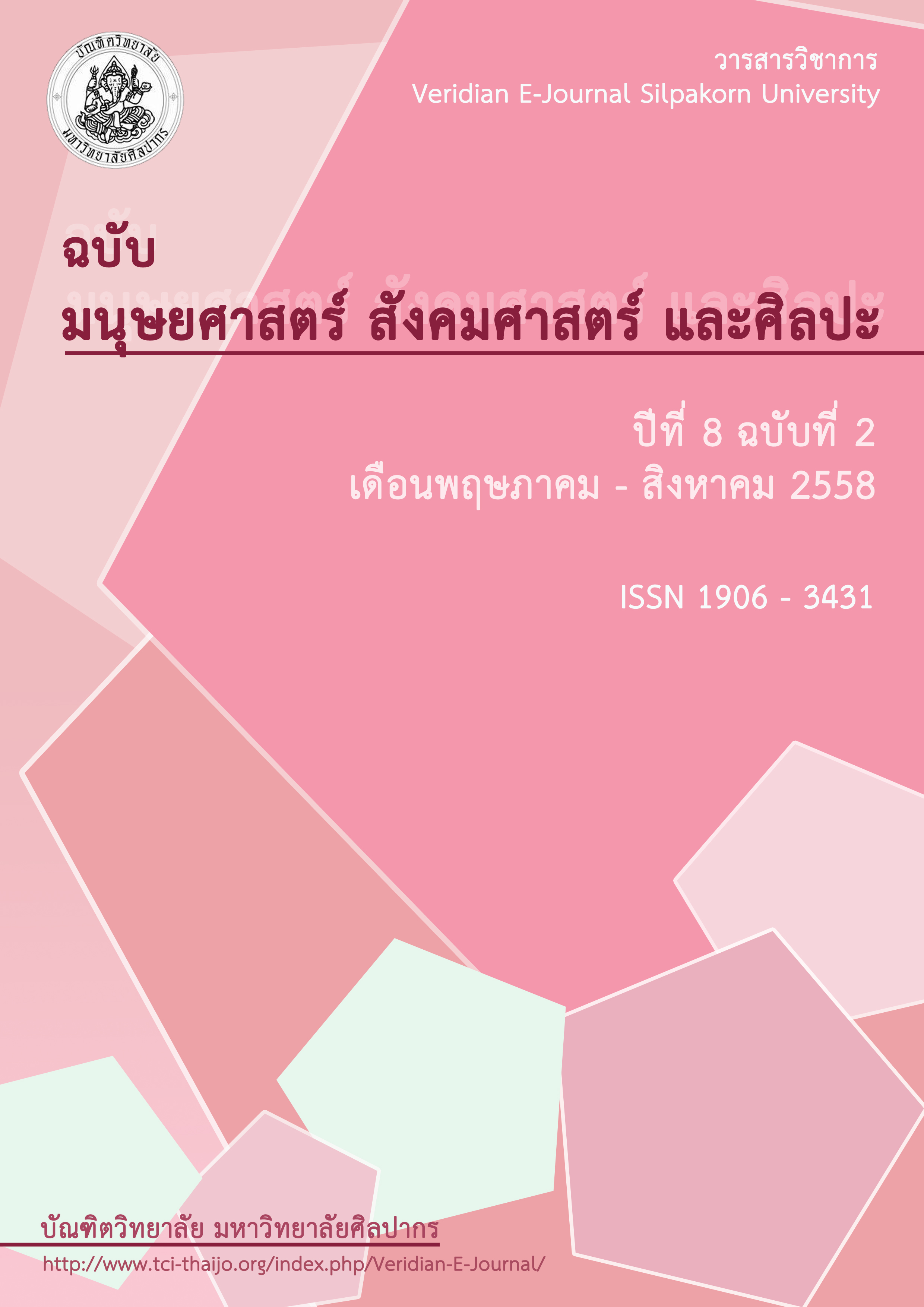การพัฒนาหลักสูตรฝึกอบรม เพื่อเสริมสร้างความสามารถในการจัดการเรียนรู้ตามแนวสะเต็มศึกษา สำหรับครูระดับประถมศึกษา
Main Article Content
Abstract
บทคัดย่อ
การวิจัยครั้งนี้มีความมุ่งหมายเพื่อ 1) พัฒนาหลักสูตรฝึกอบรมเพื่อเสริมสร้างความสามารถในการจัดการเรียนรู้ตามแนวสะเต็มศึกษา สำหรับครูระดับประถมศึกษา 2) ประเมินประสิทธิผลของหลักสูตรฝึกอบรมจากความรู้และทักษะของครู 4 ด้าน ได้แก่ 2.1) ความรู้ความเข้าใจเกี่ยวกับการจัดการเรียนรู้ตามแนวสะเต็มศึกษา 2.2) ความสามารถในการจัดการเรียนรู้ตามแนวสะเต็มศึกษา 2.3) พฤติกรรมการจัดการเรียนรู้ตามแนวสะเต็มศึกษา 2.4) พฤติกรรมการโค้ช และทักษะของผู้เรียน 3 ด้าน ได้แก่ ความสามารถในการแก้ปัญหาเชิงสร้างสรรค์ ทักษะกระบวนการทางวิทยาศาสตร์ และ ความสามารถในการใช้เทคโนโลยี วิธีดำเนินการวิจัย ประกอบด้วยขั้นตอนในการวิจัย 4 ขั้นตอน ได้แก่
ขั้นตอนที่ 1 ประกอบด้วย 2 ขั้นตอน ได้แก่ 1) สัมภาษณ์ผู้บริหารสถานศึกษา ครูชั้นประถมศึกษาปีที่ 6 และศึกษานิเทศก์เกี่ยวกับสภาพปัจจุบัน ปัญหาและความต้องการในการอบรมเกี่ยวกับการจัดการเรียนรู้ตามแนวสะเต็มศึกษา 2) สังเคราะห์เอกสารและงานวิจัยที่เกี่ยวข้องกับหลักสูตรฝึกอบรม การจัดการเรียนรู้ตามแนวสะเต็มศึกษาและการวัดและประเมินผลตามแนวสะเต็มศึกษา
ขั้นตอนที่ 2 การพัฒนาหลักสูตรฝึกอบรมฉบับร่าง และตรวจสอบคุณภาพของหลักสูตร
ขั้นตอนที่ 3 การตรวจสอบประสิทธิผลของหลักสูตรฝึกอบรม แบ่งออกเป็น 3 ระยะ ได้แก่ ระยะที่ 1 การศึกษานำร่อง เป็นการนำหลักสูตรไปทดลองใช้กับครูผู้สอนที่ไม่ใช่กลุ่มตัวอย่าง จำนวน 3 คน ระยะที่ 2 การทดลองใช้กับกลุ่มตัวอย่าง เป็นการนำหลักสูตรไปทดลองใช้จริงกับกลุ่มตัวอย่างที่เป็นครูชั้นประถมศึกษาปีที่ 6 จำนวน 9 คนที่สอนใน 3 กลุ่มสาระการเรียนรู้ ได้แก่ วิทยาศาสตร์ จำนวน 3 คน
คณิตศาสตร์ จำนวน 3 คน และการงานอาชีพและเทคโนโลยี จำนวน 3 คน ระยะที่ 3 ครูผู้สอนจัดการเรียนรู้แบบโครงงานเป็นฐานให้แก่ผู้เรียนชั้นประถมศึกษาปีที่ 6 มีนักเรียนจำนวน 50 คน ซึ่งได้จากการเลือกแบบเจาะจง
ขั้นตอนที่ 4 การปรับปรุงและพัฒนาหลักสูตร
เครื่องมือที่ใช้ในการวิจัย ประกอบด้วย 1) เครื่องมือวิจัยสำหรับครู ประกอบด้วย 1.1) แบบทดสอบวัดความรู้ความเข้าใจเกี่ยวกับการจัดการเรียนรู้ตามแนวสะเต็มศึกษา วิเคราะห์ข้อมูลโดยการหาความตรงตามเนื้อหาและใช้สถิติ Sign test 1.2) แบบประเมินความสามารถในการจัดการเรียนรู้ตามแนวสะเต็มศึกษา วิเคราะห์ข้อมูล โดยการหาค่าเฉลี่ยและส่วนเบี่ยงเบนมาตรฐาน 1.3) แบบสังเกตพฤติกรรมการจัดการเรียนรู้ตามแนวสะเต็มศึกษา วิเคราะห์ข้อมูลโดยการหาค่าเฉลี่ยและส่วนเบี่ยงเบนมาตรฐาน 1.4) แบบสังเกตพฤติกรรมการโค้ช วิเคราะห์ข้อมูลโดยการหาค่าเฉลี่ยและส่วนเบี่ยงเบนมาตรฐาน 1.5) แบบประเมินแผนการจัดการเรียนรู้ วิเคราะห์ข้อมูลโดยการหาค่าเฉลี่ย 1.6) แบบสัมภาษณ์ความคิดเห็นของครูผู้เข้ารับการฝึกอบรมที่มีต่อหลักสูตร วิเคราะห์ข้อมูลโดยการวิเคราะห์เนื้อหา 2) เครื่องมือวิจัยสำหรับผู้เรียน ประกอบด้วย 2.1) แบบวัดความสามารถในการแก้ปัญหาเชิงสร้างสรรค์ วิเคราะห์ข้อมูลโดยใช้สถิติ t-test 2.2) แบบประเมินทักษะกระบวนการทางวิทยาศาสตร์ วิเคราะห์ข้อมูลโดยการหาค่าเฉลี่ยและใช้สถิติ t-test 2.3) แบบประเมินความสามารถในการใช้เทคโนโลยี วิเคราะห์ข้อมูลโดยการหาค่าเฉลี่ย 2.4) แบบสัมภาษณ์ความคิดเห็นของผู้เรียนที่มีต่อการจัดการเรียนรู้แบบโครงงานเป็นฐาน วิเคราะห์ข้อมูลโดยการวิเคราะห์เนื้อหา สถิติที่ใช้ในการวิเคราะห์ข้อมูล ได้แก่ ร้อยละ ค่าเฉลี่ย ส่วนเบี่ยงเบนมาตรฐาน สถิติ t-test , สถิติ Sign Test และการวิเคราะห์เนื้อหา
ผลการวิจัยพบว่า หลักสูตรฝึกอบรมเพื่อเสริมสร้างความสามารถในการจัดการเรียนรู้ตามแนว
สะเต็มศึกษา สำหรับครูระดับประถมศึกษา ประกอบด้วย 1) หลักการ 2) วัตถุประสงค์ 3) สาระการเรียนรู้ 4)กิจกรรมการฝึกอบรม ประกอบด้วย 6 ขั้นตอน ได้แก่ 4.1 วางแผน 4.2 ลงมือปฏิบัติ 4.3 แลกเปลี่ยนเรียนรู้ 4.4 สะท้อนคิด 4.5 ประเมินผล และ 4.6 ให้ข้อมูลย้อนกลับ 5) สื่อการฝึกอบรม 6) การประเมินหลักสูตร ผลการตรวจสอบประสิทธิผลของหลักสูตร พบว่าหลักสูตรฝึกอบรมมีประสิทธิผลตามเกณฑ์ที่กำหนด ได้แก่ (1) ความรู้ความเข้าใจเกี่ยวกับการจัดการเรียนรู้ตามแนวสะเต็มศึกษาของครูหลังการฝึกอบรมสูงกว่าก่อนฝึกอบรม (2) ความสามารถในการจัดการเรียนรู้ตามแนวสะเต็มศึกษาของครูอยู่ในระดับสูง (3) พฤติกรรมการจัดการเรียนรู้ตามแนวสะเต็มศึกษาของครูอยู่ในระดับมาก (4) พฤติกรรมการโค้ชของครูอยู่ในระดับมาก (5) ผู้เรียนมีความสามารถในการแก้ปัญหาเชิงสร้างสรรค์หลังเรียนสูงกว่าก่อนเรียน (6) ผู้เรียนมีทักษะกระบวนการทางวิทยาศาสตร์สูงกว่าเกณฑ์ที่กำหนด (7) ผู้เรียนมีความสามารถในการใช้เทคโนโลยีอยู่ในระดับดี
คำสำคัญ : หลักสูตรฝึกอบรม , ความสามารถในการจัดการเรียนรู้ตามแนวสะเต็มศึกษา
Abstract
The purposes of this research were 1) to develop training curriculum for enhancing ability of the STEM Education learning management for primary school teachers. 2) to evaluate effectiveness of the training curriculum from knowledge and skills of teachers such as 2.1) Knowledge about the STEM Education learning management 2.2) Ability of the STEM Education learning management 2.3) Behavior of the STEM Education learning management 2.4) Coaching behavior and three types of skills of students such as ability for creative problem solving , science process skills and ability for technological application. The study was conducted under a research and development process in 4 stages as follow :
Stage 1 : Study Fundamental Data. This stage was operated in 2 steps : 1) Interview the opinions of the administrators of educational institutions , the sixth primary school teachers and education supervisor about actual conditions, problem and needs in learning management of the STEM Education. 2) Synthesizing the document and research about training curriculum and learning management of the STEM Education
Stage 2 : Develop the Draft Training Curriculum and Inspect the quality of Curriculum.
Stage 3 : Inspect the Effectiveness of Training Curriculum. This stage was operated in 3 steps : 1) Pilot study. The curriculum was try out with three teachers. 2) The curriculum was implemented on the sixth 9 primary school teachers such as Science teachers three persons , Mathematics teachers three persons and Occupations and Technology three persons were selected by volunteering and the sixth 50 primary learners 3) Teachers use Project-based learning for the sixth 50 primary students were selected by purposive sampling.
Stage 4 : Improve and Develop the curriculum.
Instruments for this research consist of 1) Research instruments for teachers such as 1.1) Test about knowledge of the STEM Education learning management for teachers and analysis data by calculating content validity and using Sign Test statistics. 1.2) Evaluating form of ability of the STEM Education learning management and analysis data by calculating mean and standard deviation. 1.3) Behavioral observation form of the STEM Education learning management and analysis data by calculating mean and standard deviation. 1.4) Coaching behavioral observation form and analysis data by calculating mean and standard deviation. 1.5) lesson Plan evaluating form and analysis data by calculating mean. 1.6) Interview form on opinions of teacher towards the training curriculum and analysis data by content analysis . 2) Research instruments for students such as 2.1) Test for ability of creative problem solving and analysis data by using t-test statistics. 2.2) Science process skills evaluating form and analysis data by calculating mean and using t-test statistics. 2.3) Ability for technological application evaluating form and analysis data by calculating mean. 2.4) Interview form for opinion of students to Project-based Learning and analysis data by content analysis. Statistics for analysis data such as percent , mean , standard deviation , t-test , Sign test and content analysis.
The findings of this study were as follows :
1.The training curriculum to enhance ability of the STEM Education learning management for primary teachers consist of 1) principles 2) purposes 3) contents 4) training activities consist of six stages : a) plan b) practice c) sharing learning d) reflect e) evaluation and f) feedback. 5) training materials and 6) evaluation. Finally , the training curriculum for enhancing ability of the STEM Education learning management for primary teachers has effectiveness given according with criteria : 1) Knowledge about the STEM Education learning management of teachers after training higher than before training 2) Ability of the STEM Education learning management of primary teachers were at high level. 3) Behavior of the STEM Education learning management of primary teachers were at the much level. 4) Coaching behavior of the STEM Education of primary teachers were at the most level. 5) There was significantly statistical difference in test score of ability of creative problem solving of students before and after Project-based learning at .01 level.
6)Science process skills of students higher than criteria. 7) Ability for technological application of students were at a good level.
keywords : Training Curriculum , Ability of the STEM Education learning management

